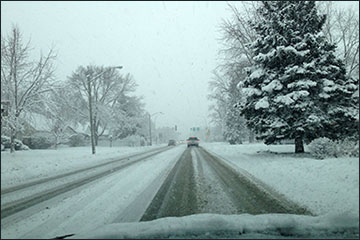Winter Tires FTW
December 9, 2012 — by Per Christensson
 Today, we had our first major snowfall of the season in Minnesota. As I was driving to church this morning, I watched several cars spin and fishtail around the snow-covered streets. Yet I had no problem controlling my car. At the intersections, stationary cars were spinning their wheels. Yet I had no problem accelerating. I even enjoyed taking corners at nearly full speed, while other cars carefully (and understandably) crawled around the corners so as not to lose control.
Today, we had our first major snowfall of the season in Minnesota. As I was driving to church this morning, I watched several cars spin and fishtail around the snow-covered streets. Yet I had no problem controlling my car. At the intersections, stationary cars were spinning their wheels. Yet I had no problem accelerating. I even enjoyed taking corners at nearly full speed, while other cars carefully (and understandably) crawled around the corners so as not to lose control.
I must have been driving a fancy all-wheel drive SUV, right? Nope. I actually drive a two-door sports coupe with front-wheel drive. The secret of my superior control in the snow is winter tires.
If you live in a northern state in the U.S. or any place that gets a fair amount of snow, I cannot stress enough how important winter tires are. Most people who haven't tried winter tires think of them as a nice idea and always seem to talk about buying them next year, but they never do. Then there are those who actually own winter tires and will not drive in the winter without them. I am one of those people.
Winter tires have a completely different rubber compound than summer or all-season tires. They have deep, squishy treads that grab the snow and greatly improve your control. Winter tires make it easier to accelerate, provide more traction when you turn, and allow you to stop much faster in the snow. Even without snow on the ground, winter tires can give you better traction in cold weather since the rubber does not harden as much as it does on other tires.
For most people, the main barrier for buying winter tires is the cost. However, the cost is actually minimal, since you are spreading the life or your tires over two sets instead of one. It's similar to alternating between two paris of shoes instead of wearing the same pair all the time. Both will last longer. Winter tires do generally have a shorter lifespan than all-season tires (since the rubber wears down faster), but they still should last several years, especially if you only run them from late November to mid-March, like I do.
A side benefit from having winter tires is that you can run high-performance summer tires instead of all-season tires during the spring, summer, and fall months. Most cars come with all-season tires, which are actually no-season tires since they compromise high performance for cold weather traction. If you've never had high-performance summer tires, trust me, they can transform the feel of your car.
Remember, your tires are the single contact point between your car and the road. Therefore, you should not underestimate their importance. Whatever you pay for winter tires (probably somewhere between $300 and $800 installed) is still less than the cost of a minor accident. They may also keep you from a major accident, which is worth far more. Even during your daily driving in the snow, winter tires will help you feel more confident and less stressed on those slippery roads, which has its own value.
There are many different types of good winter tires available. Personally, I swear by the Bridgestone Blizzaks. The Blizzak WS60 tires I have on my car right now are the best I've ever owned. If you want something a little less mushy, the Michelin X-Ice and Pirelli Sottozero are good options as well. Your mechanic or local tire shop should be able to help you make a good choice for your car. If you plan on driving the same vehicle for several years, I recommend a getting a separate set of rims, which makes the bi-annual tire swapping process faster and cheaper.
While I usually only post computing tips, I hope those of you who live in winter wonderlands will consider following this advice as well.
 Home
Home November 30th
November 30th